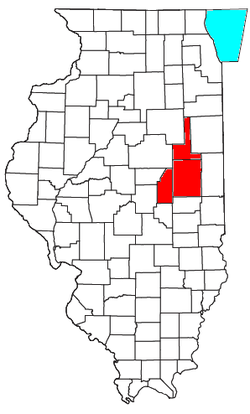Urbana-Champaign
| Champaign-Urbana metropolitan area | |
|---|---|
| MSA | |

Downtown Champaign
|
|
| Nickname(s): C-U, Chambana | |
 Champaign, Ford, and Piatt counties shown in red. Illinois portion of Lake Michigan shown in light blue. |
|
| Country |
|
| State |
|
| Largest city | Champaign |
| Counties | |
| Population (2010) | |
| • MSA | 231,891 |
| Time zone | CST (UTC-5) |
| • Summer (DST) | CDT (UTC-4) |
The Champaign–Urbana metropolitan area, also known as Champaign-Urbana and Urbana-Champaign, is a metropolitan area in east-central Illinois. It is the 191st largest metropolitan area in the U.S. It is composed of three counties, Champaign, Ford, and Piatt. The Office of Management and Budget has designated the three-county Champaign-Urbana area as one of its metropolitan statistical areas (the Champaign-Urbana, IL MSA), which are used for statistical purposes by the Census Bureau and other agencies.
The area has a population of 231,891 as determined by the 2010 U.S. Census. The area is anchored by the principal cities of Champaign and Urbana and is home to the University of Illinois at Urbana-Champaign, the flagship campus of the University of Illinois system. (University students, even those from outside the area, are included in Census figures if they were counted by the federal Census).
Journalists frequently treat the metropolitan area as just one city. For example, in 1998, Newsweek included the Champaign-Urbana Metropolitan Area in its list of the top ten tech cities (outside of the Silicon Valley). Champaign-Urbana also ranked tenth as one of the top twenty-five green cities in the United States, in a survey made by Country Home magazine.
A number of major developments have significantly changed downtown Champaign since the beginning of the 21st century. Beginning in the 1990s, city government began to aggressively court development, including by investing millions of dollars in public funds into downtown improvements and by offering developers incentives, such as liquor licenses, to pursue projects in the area. The 9-story M2 on Neil project is such an example. The project began in 2007 by taking down the facade of the deteriorated Trevett-Mattis Banking Co. which previously occupied the building site. The facade was retained on the M2 building. Residents first began to lease space in the M2 in the winter of 2009. The M2 includes not just condos for residential occupation, but also retail and office space in its lower floors, a common trend in new developments in the urban core. Across the street, a 9-story Hyatt Place boutique hotel opened in the summer of 2014. In the Campustown area adjoining the University of Illinois, the new 24-story highrise apartment building 309 Green was ostensibly completed in the fall of 2007 but had partial occupancy at least through the fall of 2008. It is 256 feet (78 m) tall, making it a full 3 stories higher than the older 21-story Tower at Third, the first contribution to the Urbana-Champaign skyline. The Burnham 310 Project, at 18 stories, which is also taller (in overall height), was finished in the fall of 2008 and includes student luxury apartments and a County Market grocery store. Burnham 310 connects downtown Champaign to Campustown. In 2013-14, four other mixed-use buildings (apartments above commercial) have been built in Campustown, with heights of 26, 13, 8, and 5 stories. On the University of Illinois campus, Memorial Stadium has gone under major renovation, with construction of new stands, clubs, and luxury suites. Across Kirby Avenue, the Assembly Hall, first built in 1963 and renamed the State Farm Center as part of a major renovation begun in 2014, continues to be the home of Illini basketball and is expected to resume hosting concerts and other performing arts after renovation is completed in late 2016. In the late 2000s, the restoration of the Champaign County Courthouse bell tower capped the expansion and renovation of Courthouse facilities and provided a striking focal point in downtown Urbana. These, among other developments, have given the Twin Cities a more urban feel.
...
Wikipedia
